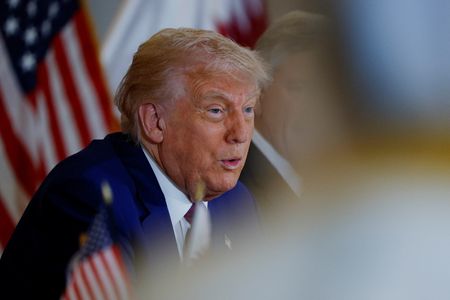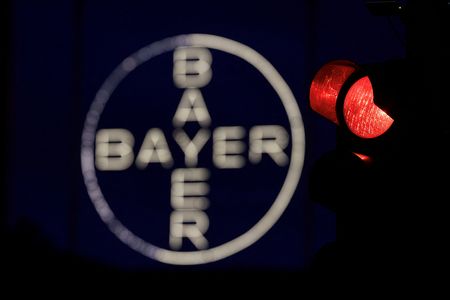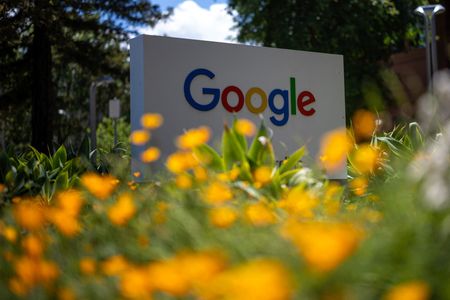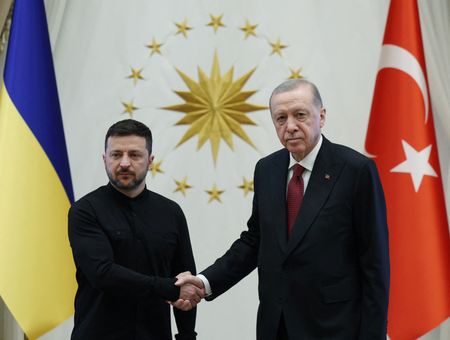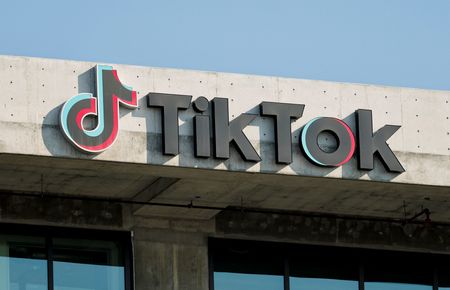By Nayera Abdallah, Parisa Hafezi and Tala Ramadan
DUBAI (Reuters) -President Donald Trump said on Thursday that the United States was getting very close to securing a nuclear deal with Iran, and Tehran had “sort of” agreed to the terms.
“We’re in very serious negotiations with Iran for long-term peace,” Trump said on a tour of the Gulf, according to a shared pool report by AFP.
“We’re getting close to maybe doing a deal without having to do this… there (are) two steps to doing this, there is a very, very nice step and there is the violent step, but I don’t want to do it the second way,” he said.
However, an Iranian source familiar with the negotiations said there were still gaps to bridge in the talks with the U.S. Oil prices fell by about $2 on Thursday on expectations of a U.S.-Iran nuclear deal that could result in sanctions easing.
Talks between Iranian and U.S. negotiators to resolve disputes over Tehran’s nuclear programme ended in Oman on Sunday with further negotiations expected, officials said, as Tehran publicly insisted on continuing its uranium enrichment.
The Trump administration gave Iran a proposal for a nuclear deal during the fourth round of negotiations on Sunday, a U.S. official and two other sources with direct knowledge of the matter told Axios.
But a senior Iranian official said Tehran had not received any fresh proposal from the United States to resolve the decades-long nuclear dispute, adding that Iran would never compromise on its right to enrich uranium on its soil.
Though Tehran and Washington have both said they prefer diplomacy to resolve the dispute, they remain divided on several red lines that negotiators will have to circumvent to reach a new deal and avert future military action.
In an interview with NBC News published on Wednesday, an adviser to Iran’s Supreme Leader Ayatollah Ali Khamenei said Iran was willing to agree to a deal with the U.S. in exchange for the lifting of economic sanctions.
Ali Shamkhani, the adviser, said Iran would commit to never making nuclear weapons and getting rid of its stockpiles of highly enriched uranium, agree to enrich uranium only to the lower levels needed for civilian use and allow international inspectors to supervise the process, NBC reported.
However, the senior Iranian official told Reuters that “the idea of sending enriched uranium above 5% is not new and has always been part of negotiations with the U.S.”
“It is a complex and technical issue and depends on the other party’s readiness to effectively and verifiably lift sanctions on Iran,” the official said.
Iranian authorities have repeatedly said that among Tehran’s red lines was reducing the amount of highly enriched uranium stockpile to a level below what was agreed under Iran’s 2015 nuclear pact with six world powers, which Trump ditched in 2018.
‘RED LINE’
U.S. officials have publicly stated that Iran should halt uranium enrichment, a stance Iranian officials have called a “red line” asserting they will not give up what they view as Iran’s right as a member of the Non-Proliferation Treaty (NPT). However, they have indicated a willingness to reduce the level of enrichment.
Iran’s clerical establishment is ready to accept some limits on its uranium enrichment, Iranian authorities have said, but in return Tehran wants the lifting of crippling sanctions imposed since 2018 and also watertight guarantees that Trump would not again ditch a nuclear pact.
Iranian sources, close to the negotiation team, said that while Iran is prepared to offer what it considers concessions, “the issue is that America is not willing to lift major sanctions in exchange.”
Regarding the reduction of enriched uranium in storage, the Iranian sources said: “Tehran also wants it removed in several stages, which America doesn’t agree with either.”
There is also disagreement over the destination to which the highly enriched uranium would be sent, the source added.
(Reporting By Nayera Abdallah and Tala Ramadan; Writing by Michael Georgy and Parisa Hafezi; Editing by Ros Russell, William Maclean)

